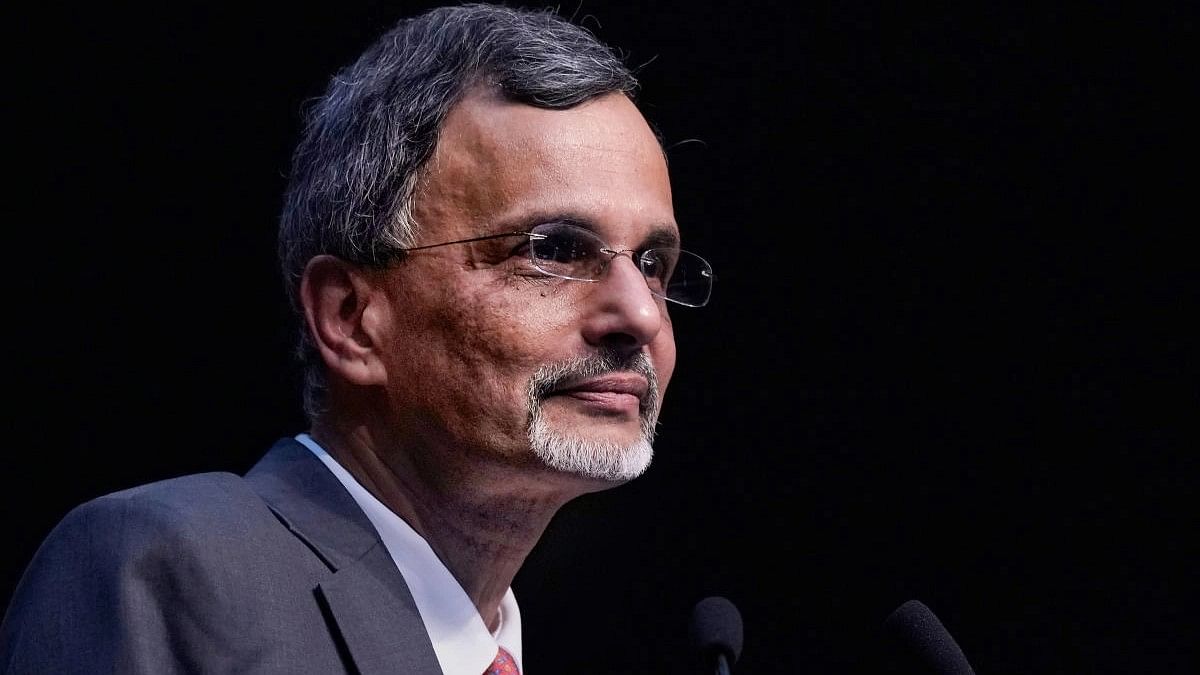
Chief Economic Advisor V Anantha Nageswaran.
Credit: PTI Photo
The Indian economy is poised to grow at an average of 6.5 per cent annually between 2023 and 2030, Chief Economic Advisor V Anantha Nageswaran said on Friday.
Speaking at the BCC&I Indo-Pacific Economic Conclave, Nageswaran said the global economy is going to witness a period of uncertainty, and India has to plug into the global supply chain and make itself attractive for the China-plus one strategy.
'We have had 9.1 per cent growth in FY22 and 7.2 per cent in FY23. We are poised to grow 6.5 per cent per annum on average for this year and the remainder of the decade. Why I am talking about 6.5 per cent and not 7.5-8 per cent? It is because we are not experiencing the kind of global growth that we experienced between 2003 and 2008,' the CEA said.
India has made progress in the last eight years as it has now become the fifth largest economy from the 10th rank globally in 2014, and within the end of this decade, it will become the third largest economy in the world, he asserted.
'Global economy is going to go through a period of uncertainty. Geo-political fragmentation, geo-economic inefficiencies, and reversal of globalisation, and all these factors are currently underway.
'Whereas between 2003 and 2008, globalisation was in its heyday. Interest rates were low or were being lowered globally..now interest rates either are rising or going to remain at a high level. We are realistic about our growth prospect, which is still going to be one of the world's highest growth rates at 6.5 per cent in real terms and 11 per cent in nominal terms,' the economist said.
He also emphasised the importance of increasing the share of manufacturing in Gross Domestic Product (GDP), and the country's contribution to global manufacturing.
'We have to build our value chains which are resistant to global tensions...We need to plug ourselves into the global supply chain and make ourselves attractive for the China-plus one strategy. India has an opportunity due to geo-political developments and we need to harness it very quickly and actively. Also, we need to make sure infrastructure for last-mile connectivity is created,' Nageswaran said.
Another important contributor to improving the economic growth rate is the country's willingness and ability to take care of micro, small and medium enterprises (MSMEs).
'We need to make sure that they are able to get access to finance, access to talent, and we do not bog them down in rules, licensing, inspection and compliance,' he said.
The private sector must think in terms of long run and large scale and invest in R&D to improve the country's manufacturing share to GDP, he said adding that manufacturing employs low and semi-skilled workers.
The CEA stressed the role of the state governments in easing land use conversion laws and facilitating land acquisitions.
According to him, farming is still going to be an important activity for a large country with a huge population like India, tech companies can contribute to it.
'And therefore, agriculture is not going to be an activity of a bygone era and it still has a future,' he said.
Nageswaran also highlighted the importance of the middle-class people's contribution to the economy.
'What else can we do to become not only the third largest economy in aggregate size but also in per capita terms to become middle or upper-middle income country? For that, we need to make sure that the aspiring middle class is not only able to get the kind of goods and services that they need but also in a position to contribute,' he said.
The size of the middle class in India is going to be 55 per cent of the population very soon, and they will be demanding quality goods and services, he said.
The CEA emphasised the need for the right education, skilling and knowledge to reap the benefits of demographic dividend.
He also said that women need to exercise their own choice and for that, the government and the private sector must do whatever they can to make the workplace safe, conducive, friendly and harmonious.